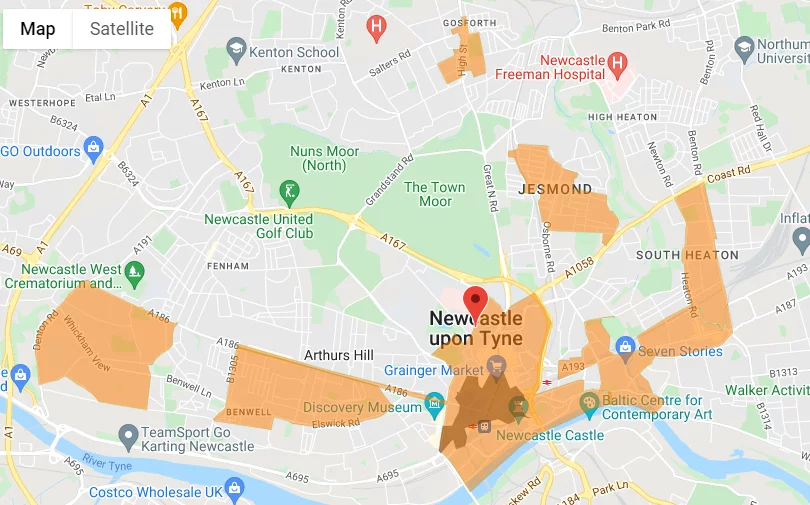Published: by Carl Weston
Last modified:
A simple guide on how to apply for a premises licence to sell alcohol and provide regulated entertainment
If you’re looking to obtain a premises licence but don’t know where to start, this guide is for you.
Most people obtain a premises licence (sometimes called liquor licence, alcohol licence, or even a pub licence) for the sales of alcohol either on or off a premises. Sometimes premises licences allow for both.
But these legal documents allow much more than that. Because a premises licence also allows a premises to provide entertainment, such as:
- Recorded or live music (including karaoke)
- Films
- Performance of dance
- Wrestling and boxing
- Indoor sporting events
- The sale of hot food and drink between 11pm and 5am.
So, as you can see, a premises licence is not just vital for alcohol sales and different styles of leisure operations, but for food takeaways, too.
Important – something to point out right off the bat is the spelling. Most people misspell premises licence by using an ‘s’ instead of a ‘c’. This is the reason why we have used both spellings in the headline of this post. But as this is a legal document, it is important that you spell it correctly; and the correct spelling of premises licence is with a ‘c’.
Important – Something else you should know, contrary to popular belief, is it is the actual premises which is granted the licence, not you personally. This is one of the reasons why a premises licence can significantly increase the value of a property. And should a licence be revoked (permanently lost) it can significantly reduce its value.
Looking for a premises licence, we can help – please get in touch today.
What is the premises licence application process?
Here, in a nutshell, are the steps you need to take / items you need to consider to obtain your premises licence and start trading.
- Hours and activities. You need to decide what opening hours you require and the type of licensable activities you want, like selling alcohol for consumption on site or selling it for takeaway / delivery purposes. If you want entertainment this will need listing also, stating desired days and times.
- Your operating schedule. You will also need to explain how you plan to ensure your customers and employees adhere to the licensing objectives.
- A plan of your premises. This should provide details of the boundaries, points of access, toilets, stair and steps, escape routes and locations of where you will be selling and consuming alcohol and / or food. Plus, areas where you might want entertainment such as DJs or karaoke (basically, the area where licensable activities will take place).
- Proof: Your proof of entitlement to work in the UK
- Consent: The consent of your designated premises supervisor – who must hold a personal licence,
- Application: Once you have all of the above, you can complete your premises licence application which you can usually submit online via the Government website
What are representations and how can they ruin your business plans?
When you apply for a premises licence, your application must be advertised to members of the local public.
These advertisements / notices give people and various authorities a chance to submit an objection, legally called a representation, to your premises licence application.
Now, you might think that representations are unlikely. And that everyone will be as enthusiastic about your new licensed premises as you are. Unfortunately, experience says something very different.
In fact, post Covid-19, local residents seem to be more vocal than ever about the opening of new licensed premises, particularly with regards noise issues and the use of outdoor spaces.
An example of how representations scuppered a planned high-end Italian restaurant in Nottingham
In a recent example, a premises licence application (our licensing solicitors we not involved) for a new, high-end Italian restaurant in Nottingham, which was on a high street with 7 other bars / pubs / restaurants, received 23 representations (objections) from highly vocal residents; all concerned over possible noise problems and general disruption.
The result? The application ended up going to a licensing hearing, where the premises licence was granted, but with reduced operating hours and a condition banning the use of the large rear garden. And most operators know that using outdoors spaces, such as large rear gardens, can significantly increase your takings and profits.
So, although the applicant obtained the premises licence and could start selling alcohol, this looks like a real missed business opportunity.
What are other restrictive conditions you might face as a result of representations?
Other restrictive conditions you might get lumbered with as a result of representations include:
- Shorter trading hours
- A requirement for door staff
- A ‘restaurant condition’. Simply put, this means you can only sell alcohol as part of a substantial meal, which is of no use to 1000s of bar and pub operators across the country.
- Noise limiters on music
And in the worst-case scenario, your application could be refused altogether, leaving your business plans in ruins.
So, if you are considering drafting a premises licence application but are a little worried that you might not get the results you need, give one of our licensing solicitors a call.
The team has helped an extraordinary number of different business types, from small family- owned independents restaurants and bars, through to national chains and international operators. And it is not just standard ‘bricks and mortar’ businesses which we help. We also obtain premises licences for websites selling alcohol online, outdoor festivals, pop-ups cinemas and pretty much any type of business you can think of.
Why does location has a massive impact on premises licence applications?
Another problem to solve when you apply for a premises licence is cumulative impact zones, (which are sometimes called special stress areas or something similar).
These zones are put in place by councils in locations where it has been identified that there is already a cumulation of too many licensed premises in an area, and the addition of any more could undermine the licensing objectives.
This means that any new premises licence applications or material variations which receive relevant representations are likely to be refused or granted with restrictive conditions, such as shorter opening hours than requested and restrictions on the use of outside spaces such as gardens or the high street in front. That is, unless you can show that your new business will not add to the cumulative impact in location.
And there are over 200 of these areas across England and Wales; and some cities, such as Newcastle have more than one!
Here is a snapshot of the cumulative impact zones in Newcastle:

What else does a premises licence allow you to provide?
Alongside, serving alcohol, a premises licence allows you to provide:
- Hot food and drink. This might sound a little strange, but you need a premises licence to sell hot food and drink between the hours of 11pm and 5am. You can only sell hot food and drink without one during hours outside of these times. So, as you can imagine, premises licences are vital legal documents for takeaways. We have helped brands like Domino’s, Five Guys, KFC, and 100s of independent takeaways obtain premises licences for their businesses.
- Entertainment: This covers items such as recorded and live music, plays, indoor sporting events and even entertainment facilities like karaoke machines.
You’ll also need a personal licence to sell alcohol
There is another licence that you need before you can obtain your premises licence, and that is a personal licence.
As the name suggests, this is not a legal document for the premises itself, it is legal document that you, or someone else working at the premises, needs to authorise the sale of alcohol.
The criteria for obtaining a premises licence are that the person:
- must be over 18 years old
- must possess an accredited licensing qualification, such as the Award for Personal Licence Holders (APLH).
- must not have had a personal licence forfeited in the last five years
- must be entitled to work in the United Kingdom
- must pay the appropriate fee and complete an application form
- must supply two passport style photographs, signed by a solicitor or anyone else with standing in the community
- must not have a conviction for any “relevant” offence or foreign offences
And the last part of the application puzzle is for you to nominate someone to be your designated premises supervisor, commonly called a DPS. This person must have their personal licence. For clarity, this is an individual who is in day to day control of the business and responsible for the provision of the licensable activities at the premises.
To obtain a personal alcohol licence, you will need to pass the BIIAB Level 2 Award for Personal Licence Holders (APLH) exam, a qualification administered by the British Institute of Innkeeping. Take our free mock exam.
How our licensing solicitors can help
We have made thousands of applications for premises licences over the years, covering every sector and type of operation you can imagine. And just as your business is unique, no one premises licence application is identical to another. We can help you draw up your detailed Operating Schedule which must accompany your application as well as advising on your layout plans to ensure that they comply with the legislation.
We can also put you and your team through the training and exams for the personal licence, something that your designated premises supervisor must have.
And should your applications attract representations (objections), we can negotiated them away or, if the representations are persistent, represent you at a licensing hearing.
Our licensing solicitors are trusted by national brands such as: Young’s, Fuller’s, Mitchells & Butlers, REKOM, wagamama, PizzaExpress, Stonegate Pub Company, Honest Burger, Bill’s, Cote many more besides.
But it is not just the ‘big boy’s which we act for, we also help one man bands, small independents and growing brands across the whole of the leisure sector.
What next:
If you have found a site that you would like to trade from, why not email to us for an opinion? We can let you know if the site sits in an area subject to a cumulative impact policy, and what that means for your plans. You can also do this yourself by using our cumulative impact finder tool, CizApp, available here: https://www.cizapp.co.uk
We can also give you an opinion – free of charge – on the types of issues that you are likely to face and the items you should consider to get the premises licence that best suits your business.
Plus, our licensing solicitors would be happy to give you an opinion – free of charge- on the types of issues that you are likely to face and the items you should consider to obtain the premises licence that best suits your business. Get in touch today.
To download a printable PDF version of this, click here.
Below contains information explaining what a premises licence is, how to obtain it and what the holders obligations are.
Something else you might like…
- News
- Premises licence
Premises licence revocations
Gain a better understanding on what a premises licence revocation is and what to do to prevent one
- News
- Premises licence
- Premises licence
How long does it take to get a premises licence?
Read about the time it takes before you can open your doors (or launch your website) for alcohol sales
- News
- Premises licence
Our Guide to What a Premises Licence Review Is and What You Can Do if You Are Facing One?
Here you can learn about what a premises licence review is and what you can do if you are facing…

